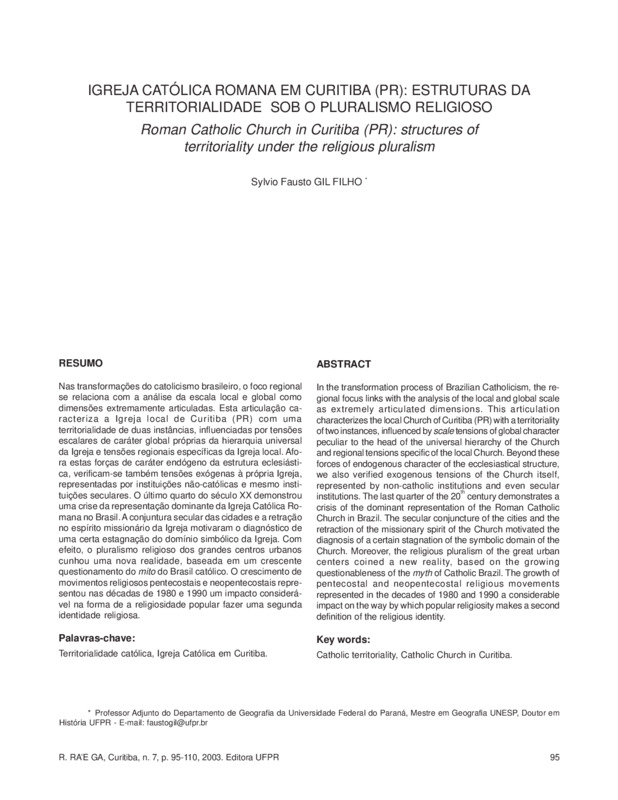IGREJA CATÓLICA ROMANA EM CURITIBA (PR): ESTRUTURAS DA TERRITORIALIDADE SOB O PLURALISMO RELIGIOSO
Item
-
Título
-
IGREJA CATÓLICA ROMANA EM CURITIBA (PR): ESTRUTURAS DA TERRITORIALIDADE SOB O PLURALISMO RELIGIOSO
-
Raega - O Espaço Geográfico em Análise
-
UFPR
-
Autor
-
Sylvio Fausto GIL Filho
-
Assunto
-
Igreja Católica em Curitiba
-
Territorialidade católica
-
Abstract
-
Nas transformações do catolicismo brasileiro, o foco regional
se relaciona com a análise da escala local e global como
dimensões extremamente articuladas. Esta articulação caracteriza
a Igreja local de Curitiba (PR) com uma
territorialidade de duas instâncias, influenciadas por tensões
escalares de caráter global próprias da hierarquia universal
da Igreja e tensões regionais específicas da Igreja local. Afora
estas forças de caráter endógeno da estrutura eclesiástica,
verificam-se também tensões exógenas à própria Igreja,
representadas por instituições não-católicas e mesmo instituições
seculares. O último quarto do século XX demonstrou
uma crise da representação dominante da Igreja Católica Romana
no Brasil. A conjuntura secular das cidades e a retração
no espírito missionário da Igreja motivaram o diagnóstico de
uma certa estagnação do domínio simbólico da Igreja. Com
efeito, o pluralismo religioso dos grandes centros urbanos
cunhou uma nova realidade, baseada em um crescente
questionamento do mito do Brasil católico. O crescimento de
movimentos religiosos pentecostais e neopentecostais representou
nas décadas de 1980 e 1990 um impacto considerável
na forma de a religiosidade popular fazer uma segunda
identidade religiosa.
Roman Catholic Church in Curitiba (PR): structures of
territoriality under the religious pluralism
Abstract
In the transformation process of Brazilian Catholicism, the regional
focus links with the analysis of the local and global scale
as extremely articulated dimensions. This articulation
characterizes the local Church of Curitiba (PR) with a territoriality
of two instances, influenced by scale tensions of global character
peculiar to the head of the universal hierarchy of the Church
and regional tensions specific of the local Church. Beyond these
forces of endogenous character of the ecclesiastical structure,
we also verified exogenous tensions of the Church itself,
represented by non-catholic institutions and even secular
institutions. The last quarter of the 20th century demonstrates a
crisis of the dominant representation of the Roman Catholic
Church in Brazil. The secular conjuncture of the cities and the
retraction of the missionary spirit of the Church motivated the
diagnosis of a certain stagnation of the symbolic domain of the
Church. Moreover, the religious pluralism of the great urban
centers coined a new reality, based on the growing
questionableness of the myth of Catholic Brazil. The growth of
pentecostal and neopentecostal religious movements
represented in the decades of 1980 and 1990 a considerable
impact on the way by which popular religiosity makes a second
definition of the religious identity.
-
volume
-
7
-
Date
-
2003
-
Língua
-
pt
-
doi
-
10.5380/raega.v7i0.3355
-
issn
-
2177-2738
-
título curto
-
IGREJA CATÓLICA ROMANA EM CURITIBA (PR)
-
Rights
-
Direitos autorais


